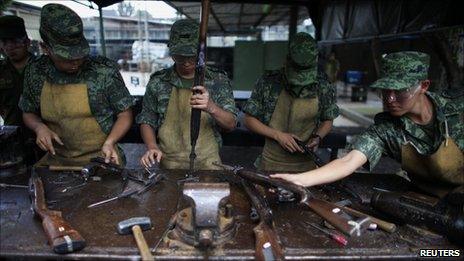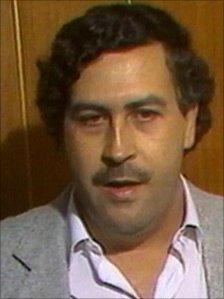Is Mexico at threat from a drugs insurgency?
- Published

Seized weapons show how Mexico's drug gangs do not lack firepower
Comparisons have been made before between Colombia of the 1980s and Mexico today with regards to drug-trafficking. But never before has a senior member of the US administration made such an explicit comparison.
"It's looking more and more like Colombia looked 20 years ago," said US Secretary of State Hillary Clinton on Wednesday, pointing out that narco-traffickers control certain, although not significant parts, of Mexico.
In Colombia, she said, "it got to the point where more than a third of the country, nearly 40% of the country at one time or another was controlled by the insurgents."
Mexico was quick to react, with officials stressing that they "did not share" Mrs Clinton's vision.
President Felipe Calderon's government has always rejected such comparisons.
National Security spokesman Alejandro Poire recognised "some similarities" in the way criminal gangs operated in both Latin American nations, but he said violence in both nations "was fuelled by the enormous demand for drugs in US".
Both Mexico and Colombia have indeed had to tackle the threat posed by drug-trafficking to the institutions of state, analysts say.
The number of people killed in Colombia when Pablo Escobar was the leader of the Medellin drug cartel "was thousands, killed by indiscriminate violence and bombings, a total challenge to the State," said Samuel Gonzalez Ruiz, former head of the Mexican government's organised crime unit and UN adviser.
"In this sense, it is similar to Mexico now."
Guerrilla war
Since President Calderon launched his fight against the drug gangs in December 2006, it is estimated more than 28,000 people have died in Mexico.
The main point both countries have in common, according to Mr Gonzalez Ruiz, is that "the State is weak, allowing organised and extremely violent criminal gangs to emerge", which in turn pose a threat to political and social structures.

Drug lord Pablo Escobar and his Medellin cartel were once powerful
Jose Luis Pineyro, a national security expert at Mexico City's Metropolitan Autonomous University (UAM), says that in the region criminal gangs have or had "a wide social base and the capacity to infiltrate municipal and state governments that has allowed them to gain control of small towns and areas".
But Mexico is not a replica of Colombia, analysts say.
"In Colombia, a leader like Escobar declared war on the State, while the struggle in Mexico has two aspects: on one hand a civil war among the drug cartels for control of drug markets, and on the other the State's war on crime" said Mr Gonzalez Ruiz.
Colombia also had to confront both drug cartels and guerrilla groups, which over time ended up having direct links.
"While it is clear there is an alliance between guerrillas and drug-trafficking in Colombia, in Mexico there are no 'narcoguerrillas'," said Mr Pineyro.
"There are some commandos but not guerrilla movements as such and the authorities have not found any signs of links between these groups and drug trafficking."
Mexico also does not have large paramilitary movements like those which controlled large areas of Colombia when the war on drug gangs was at its height, said Mr Pineyro.
Both Mexico and Colombia have received US support in the battle against drug-trafficking, both logistical and economic support.
Plan Colombia has cost Washington some $7bn since the US and Colombia signed the agreement in 1999.
The Merida Initiative, in train since 2008, is a three-year security co-operation programme under which the US is spending some $1.7bn on helping Mexico and Central America tackle drug-trafficking.
"It is not just a question of planes, weapons and electronic equipment," said Mr Gonzalez Ruiz. "What is needed is a strengthening of the State, irrespective of whatever economic aid is sent under these plans."
The main challenge, analysts say, is to firm up state institutions and expunge organised crime from government and police structures.
Translated from Spanish by Liz Throssell, BBC News